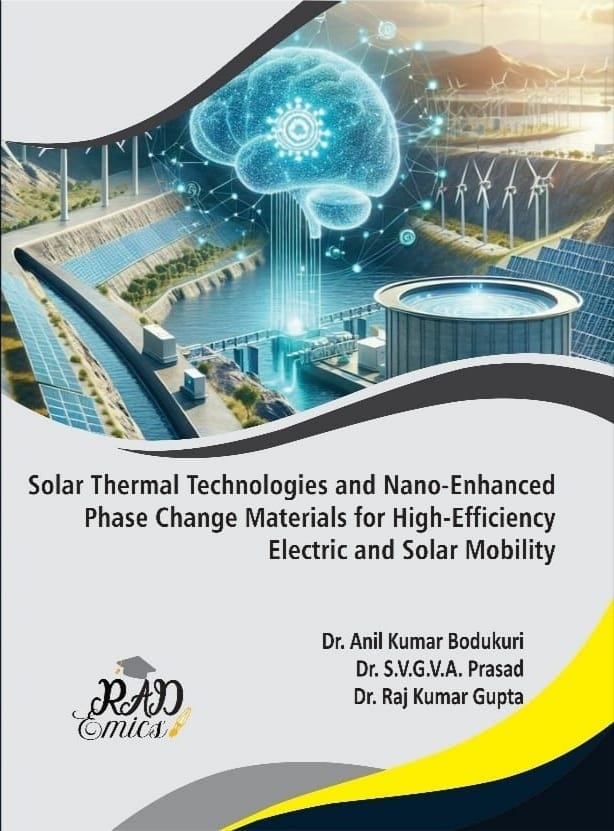
Author Name : T. Mohankumar, M. Chiranjivi
Copyright: @2025 | Pages: 38
DOI: 10.71443/9789349552654-08
Received: 23/03/2025 Accepted: 22/05/2025 Published: 27/06/2025
The transition toward sustainable mobility necessitates intelligent thermal energy management strategies, especially in solar-assisted hybrid electric vehicles (HEVs) where fluctuating solar input and dynamic operational loads challenge system efficiency. This chapter presents a comprehensive framework integrating algorithmic intelligence and social pedagogy to optimize thermal energy storage (TES) using nano-enhanced phase change materials (Nano-PCMs). The application of advanced computational techniquesâ€â€Âsuch as genetic algorithms, reinforcement learning, and hybrid optimization modelsâ€â€Âenables precise control and real-time adaptation of TES performance under variable environmental conditions. The synergistic incorporation of Nano-PCMs significantly enhances the thermal conductivity and energy density of storage systems, supporting efficient heat absorption and release during vehicular operation. The the integration of pedagogical perspectives ensures user-centric design and societal alignment, enhancing both functional reliability and public acceptance. The chapter also explores adaptive thermal regulation strategies based on solar irradiance variability, predictive modeling for battery temperature control, and multi-objective optimization for system efficiency. By bridging material science, artificial intelligence, and behavioral insights, this interdisciplinary approach advances the development of intelligent, energy-resilient transport systems. The proposed framework not only contributes to reducing fossil fuel dependency and greenhouse gas emissions but also establishes a foundation for future research in sustainable vehicular thermal management.
The global urgency to transition toward cleaner energy systems has intensified research into hybrid electric vehicles (HEVs), particularly those augmented with solar energy harvesting [1]. These vehicles offer the dual advantage of reduced fossil fuel reliance and enhanced energy diversification. A core challenge in their widespread deployment, The lies in effectively managing thermal loads arising from energy storage and conversion processes. As batteries and power electronics operate within narrow thermal tolerance ranges, uncontrolled thermal behavior can degrade system efficiency, shorten lifespan, and compromise safety [2]. Thermal energy storage (TES) systems have thus emerged as a strategic solution to buffer temperature fluctuations, enabling stable vehicle operation under diverse environmental and load conditions [3]. Among various TES mediums, phase change materials (PCMs) have shown significant promise due to their ability to absorb and release latent heat at defined temperatures [4]. The conventional PCMs often suffer from low thermal conductivity and sluggish response times, limiting their real-time applicability in vehicular systems. Recent advances in nanotechnology have led to the development of nano-enhanced PCMs (Nano-PCMs), which integrate thermally conductive nanoparticles into base PCMs, substantially enhancing thermal performance. These materials provide the foundation for smarter, more efficient TES systems capable of handling the dynamic thermal demands of solar-assisted HEVs. To fully realize this potential, these systems require intelligent control algorithms capable of optimizing energy flow, predicting thermal loads, and adapting in real time to variable conditionsâ€â€Âsetting the stage for the integration of algorithmic intelligence into vehicular thermal management [5].
Thermal management in HEVs is inherently a multi-variable optimization problem influenced by solar irradiance, ambient temperature, driving patterns, and component interactions [6]. Conventional static control methods often fall short in responding to such rapidly changing parameters. Consequently, the need for adaptive, self-learning systems that can analyze vast data inputs and derive optimal thermal management strategies in real-time is critical [7]. Algorithmic intelligence, encompassing computational tools like genetic algorithms, particle swarm optimization, and reinforcement learning, has proven particularly effective in managing such complex systems [8]. These algorithms can simultaneously balance multiple performance criteria such as heat transfer efficiency, energy consumption, battery temperature uniformity, and TES material integrity. By learning from past data and current conditions, such models can recommend decisions that maximize overall system performance. Reinforcement learning can dynamically adjust thermal control strategies based on environmental forecasts and vehicle telemetry, while evolutionary algorithms can optimize Nano-PCM geometry and placement for effective heat distribution. The hybrid models that combine multiple algorithmic approaches offer even greater flexibility and robustness, adjusting not only the control strategy but also the configuration of TES materials and subsystems [9]. The integration of these smart algorithms transforms TES from a passive system into an active, adaptive subsystem that evolves with user behavior, climatic conditions, and vehicle performance [10].